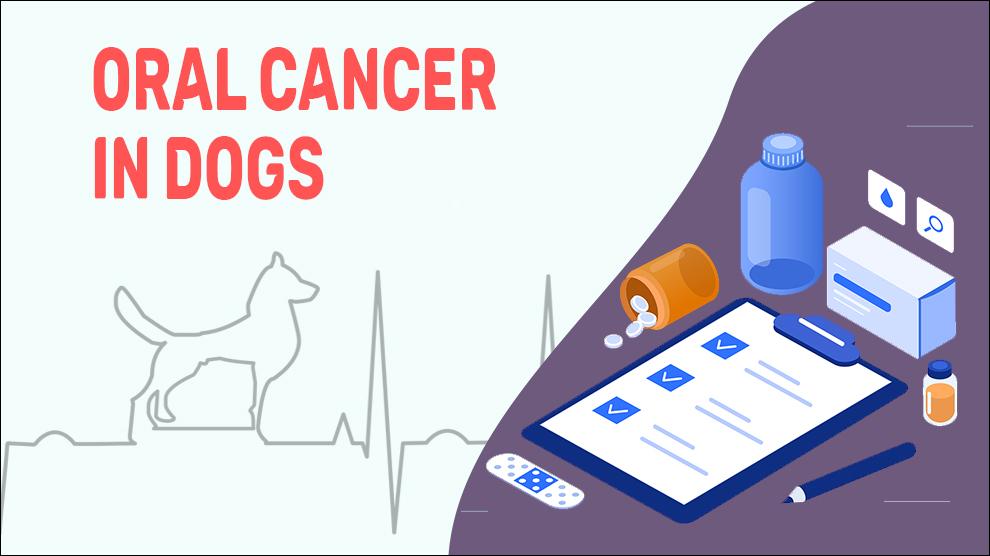Canine oral tumors are somewhat common. Malignant and benign oral cavity (mouth) tumors account for 5% of all tumors in dogs.
The dog’s oral cavity consists of more than just its gums and teeth. This also includes cheeks, upper and lower jaw, lips, tongue, mouth floor, and the hard and soft palate (roof of the mouth). Most commonly, canine oral tumors are found around the gums and/or on the roof of the mouth, but they can be located anywhere in the oral cavity.
The most common benign tumors are epulides (proliferations of gingiva arising from the periodontal ligament) and papillomas (outward-growing lumps). The most common malignant tumors are fibrosarcomas (tumors arising from fibroblasts of connective tissue), squamous cell carcinomas (tumors from the surface layers of the oral cavity), and melanomas (mucosal tissues of the mouth).
Oral tumors come in many types and the dog’s clinical signs will depend on the tumor location, tumor size, tumor type, and any metastasis.
Symptoms Of Oral Cancer
Symptoms depend on the type of oral cancer.
General Symptoms:
- Abnormal swelling of the tongue, soft tissue, or gums.
- Abnormal discoloration of gums, tongue, or soft tissue.
- Extreme and unusual bad breath (halitosis).
- Excessive drooling
- Swollen or deformed areas of the face or muzzle.
- Refusal or reluctance to eat.
- Loose teeth
- Difficulty chewing (dysphagia) or drinking.
- Swollen lymph nodes
Treatment Options For Oral Cancer
A definitive diagnosis can be done by taking an oral biopsy to determine the type and severity of the tumor.
Treatment protocol for oral cancer is directed towards controlling the local tumor and tackling the concern for metastasis.
For Canines with oral tumors, chemotherapy and/or surgery may be suggested. When local lymph nodes are affected, they will be removed through surgery.
When surgery cannot be performed, radiation therapy is the treatment choice.
Check with your vet to make you decide on the most fitting foods for your dog.
Work out your dog's daily calorie intake - 70 x (Ideal Body Weight in kg)^0.75. Find out the right food and amount.
Home Remedies For Oral Cancer
- The simple thing you can do to keep your pet’s mouth in good physical condition is to brush your dog’s teeth regularly.
- Add Oral healthy foods to the dog diet:
- Parsley and Mint
- Natural yogurt
- Wheatgrass
- Cinnamon
- Coconut oil
Prevention Of Oral Cancer
Prevention is not possible for oral cancers. Treatment and survival rates vary depending on the grade and stage of the neoplasm.
- Brush your dog's teeth regularly. Prevent plaque/tartar accumulation using pet-safe enzymatic toothpaste that is specially formulated for dogs at least 2 - 4 times each week.
- Chew toys for dog treats, or oral rinse or Dental wipes may also help decrease or delay plaque/tartar by reducing the build-up of pathogens on the surface of the teeth and gums.
Affected Breeds Of Oral Cancer
Cocker Spaniel, German Shepherd, German Shorthaired Pointer, Weimaraner, Golden Retriever, Gordon Setter, Miniature Poodle, Chow Chow, Boxer, Chihuahua, Labrador Retriever, Scottish Terrier, Schnauzer, Standard Poodle, Springer Spaniel
Additional Facts For Oral Cancer
- Causes:
- Genetic predisposition
- Exposure to toxic chemicals, pollutants
- Inflammatory viral infections
- Stages:
- Stage 0: Oral tumor in situ.
- Stage 1: Malignant spread <2cms and has not extended to lymph.
- Stage 2: Malignant spread >2cms and has not extended to lymph.
- Stage 3: > 4 cms and has spread to lymph nodes.
- Stage 4: Apparent metastatic disease. The most advanced stage. Cancer has metastasized to distant organs.
- Mortality:
Canine oral tumors have average (median) survival times of 1 - 3 months without treatment. The mortality rate of oral cancers is higher than that of other cancers. Most affected dogs are euthanized humanely due to the local effects of the primary tumor and poor quality of life.
- Diagnosis:
- Routine Dental Exam
- Urinalysis and Bloodwork
- Lymph Node Biopsy
- Dental X-rays
- Prognosis:
The canine oral tumors prognosis for recovery is highly unpredictable and depends on several factors, including the stage, histologic subtype, lymph node or distant metastasis, and response to treatment.
Clinical Stage I Disease: Median survival time is approximately 2 years (radiation therapy treatment).
Clinical Stage II Disease: Median survival time of 15 months.
Dogs with higher clinical stages have the worse prognosis, with reported median survival times < 6 months after treatment.
When To See A Vet
Contact your vet right away, if you notice any of the following:
- Abnormal swelling of the tongue, soft tissue, or gums.
- Abnormal discoloration of gums, tongue, or soft tissue.
- Extreme and unusual bad breath (halitosis).
Food Suggestions For Oral Cancer
- Protein: High protein diet comprising 40% of dogs’ calories. Fresh, lean protein sources (Lean chicken or turkey breast, lean beef, skinless turkey or chicken).
- Vitamin-rich fruits and veggies: Lentils, green beans, chickpeas, cabbage, cauliflower, tomatoes, broccoli, citrus fruits (oranges).
- Omega 3 fatty acid foods (Sardines, Mackerel, Herring, etc).
- Beta carotene foods - Orange, yellow, and green leafy vegetables and fruits (such as tomatoes, carrots, spinach, lettuce, sweet potatoes, cantaloupe, broccoli, etc).
- Antioxidants - Blueberries, Cauliflower, Beets, Beans, etc.
- Flavonoids - Blueberries, blackberries, cranberries, eggplant, etc.
Conclusion
For dogs receiving surgery for an Oral carcinoma median survival time is approximately 2 years, while for affected dogs without surgery the survival rates are comparatively less. Oral tumor surgical removal has a guarded prognosis, and the dog's survival following treatment depends on many other factors.

















